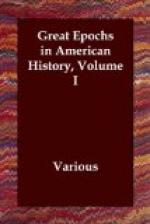But tho our own annals give us so scanty an account of the reception of the two Cabots, the want is to some extent supplied from a foreign source. Letters are extant from the Venetian ambassador, in which he describes with just pride the enthusiasm with which his countryman was received by the people when he walked along the streets.
The next year saw Cabot again sailing with a fresh patent. Several points in it are worthy of notice. John Cabot is alone mentioned by name. From this it might be, and, indeed, has been inferred that the part played by Sebastian Cabot in the first voyage was merely secondary, and that John was the principal conductor of the first voyage, as he was by the patent designed to be of the second. He is authorized in person or by deputy to take six English ships of not more than 200 tons burden each, and to lead them to the land which he had lately discovered. There is no limitation, either of departure or return, to Bristol, and no mention is made of royalties. Probably the original provisions were still regarded as binding, except so far as rescinded or modified by the second patent.
In 1498 Sebastian Cabot sailed from Bristol with one vessel manned and victualed at the king’s expense, accompanied by three ships of London, and probably some of Bristol itself. His cargo consisted of “grosse and sleighte wares,” for trafficking with the natives. So scanty are the records of Cabot’s two expeditions, that altho we know the geographical extent of his discoveries, yet it is impossible to assign to each voyage its proper share. We know that in one or other of them he reached 67-1/2 degrees of north latitude, and persuaded himself that he had found the passage to Cathay. The fears, however, of his sailors, justified, perhaps, by the dangers of the north seas, withheld him from following up the enterprise. He then turned southward and coasted till he came into the latitude of 38. Of the result of the second voyage and of Sebastian Cabot’s reception in England we hear nothing. He disappears for a while from English history, carrying with him the unfulfilled hope of a northwest passage, destined to revive at a later day, and then to give birth to some of the most daring exploits that have ever ennobled the names of Englishmen.
[1] From Doyle’s “English Colonies in America.” Published by Henry Holt & Co. The Cabots in 1497 discovered what came to be known afterward as the continent of North America, Columbus in 1492 having discovered only islands in the West Indies. The work of the Cabots in after years was a basis of English claims to the continent because of priority of discovery. It was not until his third expedition, fourteen months after the discovery made by the Cabots, that Columbus first saw the North American mainland.
II
Peter martyr’s account[1]




